Module 5 My school dayUnit 2 We start work at nine o’clock. 课件(32张PPT)
文档属性
| 名称 | Module 5 My school dayUnit 2 We start work at nine o’clock. 课件(32张PPT) | 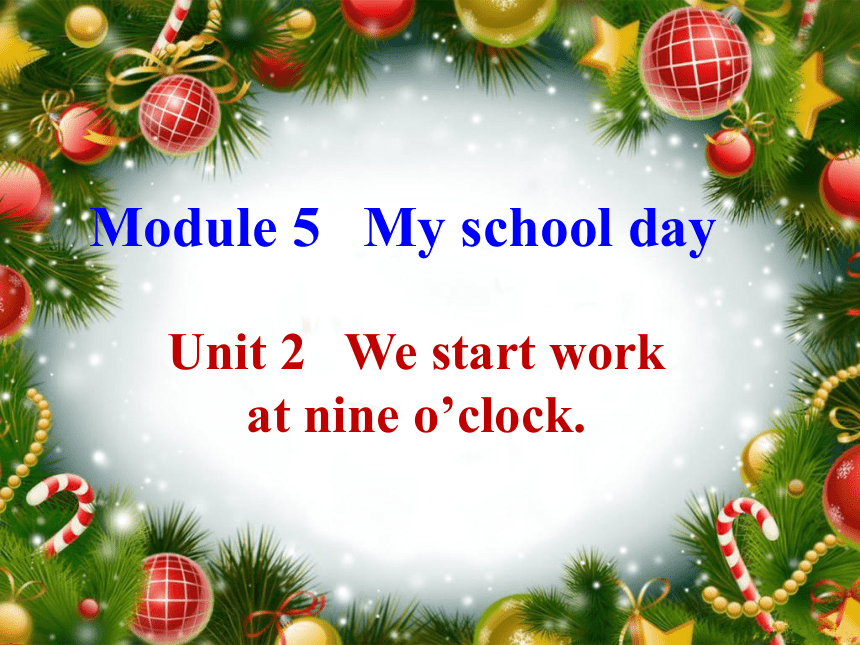 | |
| 格式 | zip | ||
| 文件大小 | 2.4MB | ||
| 资源类型 | 教案 | ||
| 版本资源 | 外研版 | ||
| 科目 | 英语 | ||
| 更新时间 | 2018-10-21 22:48:36 | ||
图片预览

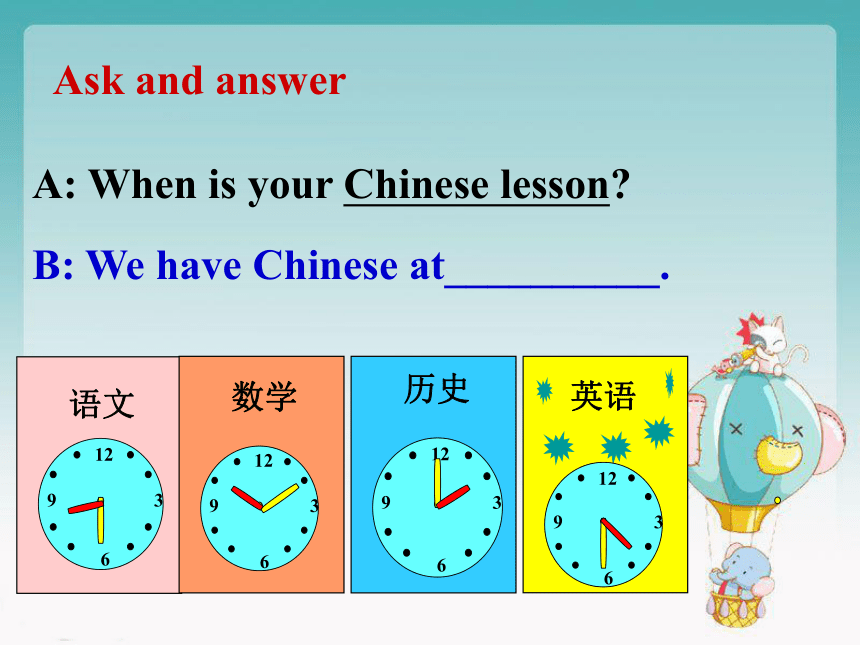

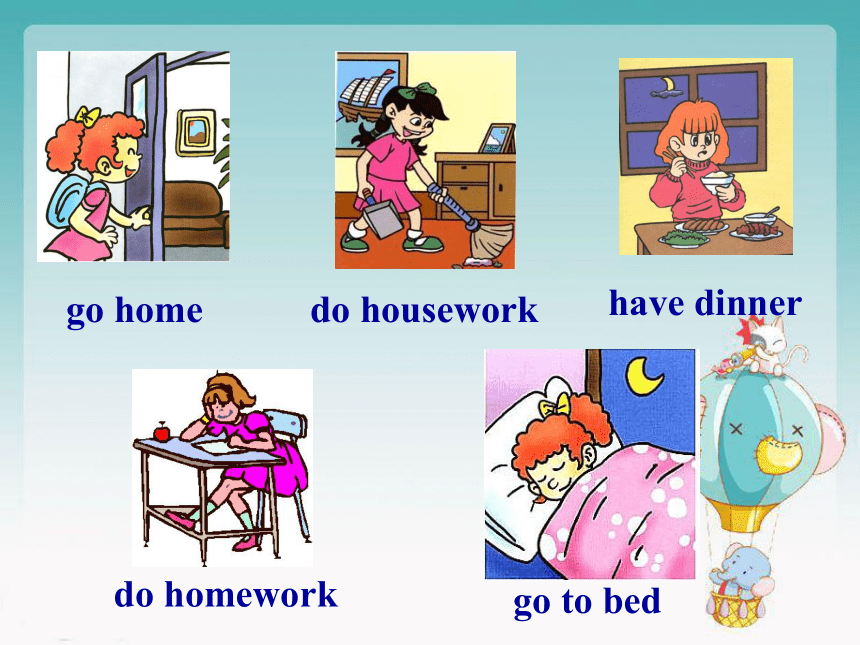
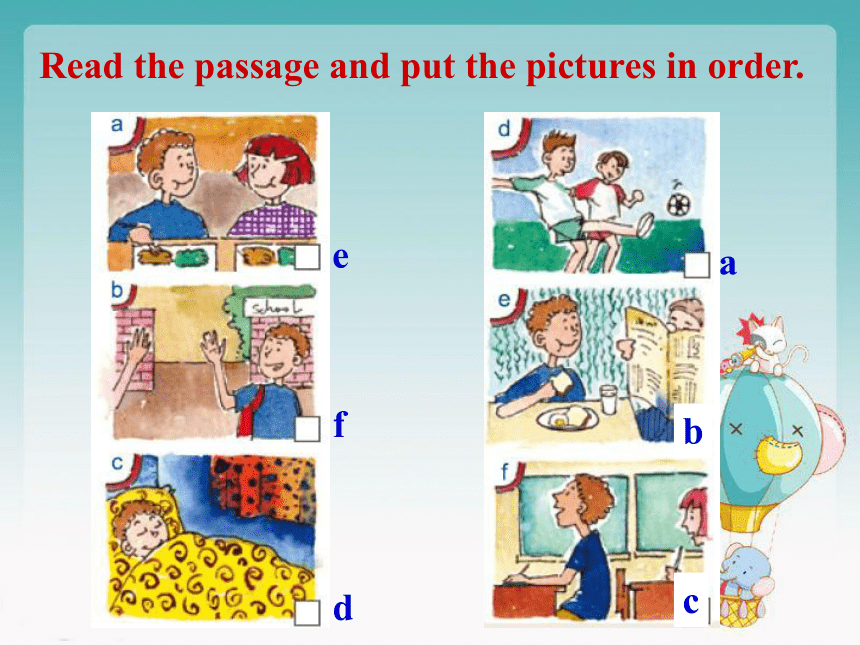



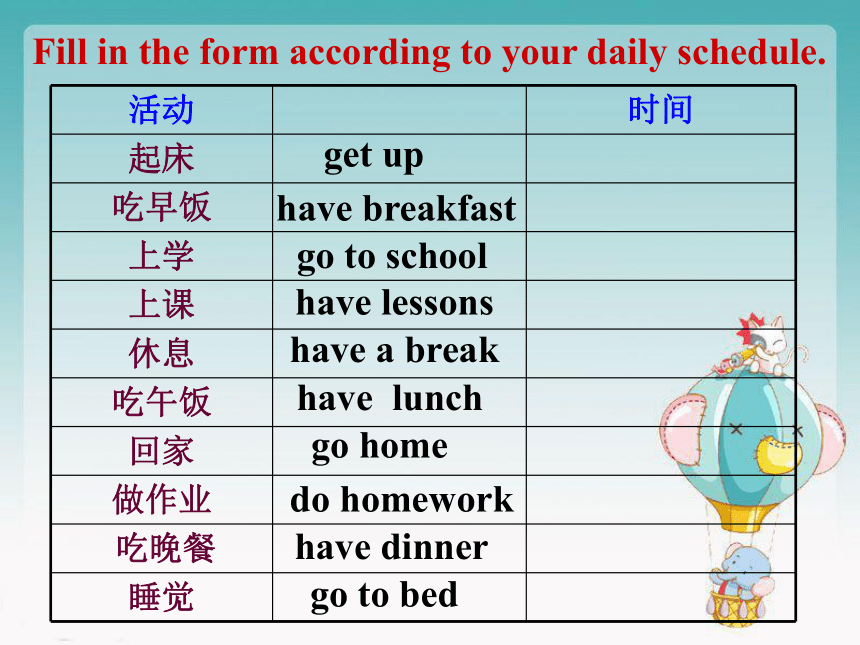
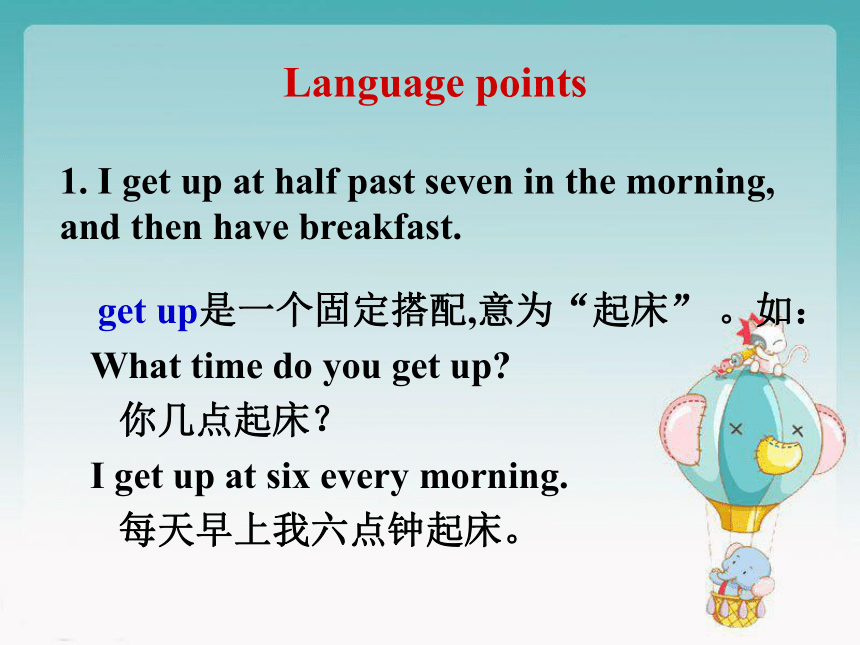
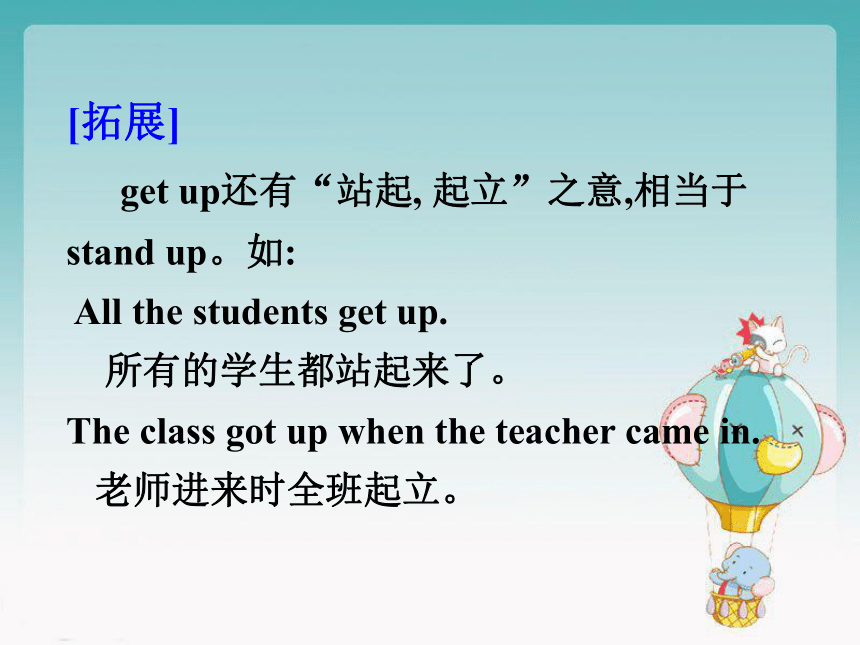

文档简介
课件32张PPT。Unit 2 We start work at nine o’clock.Module 5 My school dayA: When is your Chinese lesson?B: We have Chinese at__________. Ask and answerTalk about your school day.go to schoolget uphave breakfasthave lunchhave lessons have a breakhave dinnerdo houseworkgo homedo homeworkgo to bedRead the passage and put the pictures in order.efdabcgo to school9:00have a breakhave lunchlessons start in the
afternoon3:30in the eveninggo to bedFill in the form as quickly as possibleecdabfUnderline the correct expressions.I get up / start work at half past seven.
We have a break / have lunch at half past twelve.
I go home / watch TV in the evening.
I do my homework / see my friends in the evening.
I go home / go to sleep at ten o’clock.Read the passage and check the sentences true or false. I have breakfast at 7:00 in the morning.
2. I go to school at 8:30.
3. I play football at 11:00.
4. We have meat and rice with vegetables or hamburgers at 12:30.
5. Lessons finish at 3:30.
6. I do my homework at 10:00 in the evening.FTTTFFFill in the form according to your daily schedule. have breakfasthave lessonshave a breakhave lunchgo homedo homeworkhave dinnergo to bedgo to schoolget up Language points1. I get up at half past seven in the morning, and then have breakfast. get up是一个固定搭配,意为“起床” 。如:
What time do you get up?
你几点起床?
I get up at six every morning.
每天早上我六点钟起床。[拓展] ???? get up还有“站起, 起立”之意,相当于stand up。如:
All the students get up.
所有的学生都站起来了。
The class got up when the teacher came in.
老师进来时全班起立。get upget / stand up1. 他们早上7点半起床。
They _______ _______ at half past seven in the morning.
2. 请站起来。
Please ________ ________.[Practice] Complete the sentences. and then 相当于一个副词,意思是“于是,然后”。如: Let’s go for a drink and then go home.
我们先去喝一杯然后再回家。
Read the text first and then explain the new words.
先读课文,然后解释生词。2. Then we go home at half past three. then用作副词,表示“那是,然后,当时”。
Then he went back to his seat.
然后他回到座位上去。
Then he slowly walked past the house.
然后他慢慢地走过这座房子。
His dog nosed me, and then let me go in.
他的狗闻了闻我,然后放我进去了。[拓展] then, and then的区别:
二者都表示“然后,于是”,都起着副词的作用,只是在语气上and then更强调前后两个事物时间上联系得更紧密些,and then可以引导并列句,then则不行。
He came here and then he left.
He came here. Then, he left. go home是一个固定搭配,意为“回家”。因为home在这里作副词, 故home的前面不能加介词to。如:
We go home at half past three.
我们3点半回家。
Can I go home now?
我现在可以回家吗?[拓展] ???? go to school表示“去上学”, go to work表示“去上班”, go to bed表示“去睡觉”。如:? In the evening, I go home and have dinner.
Students go to school at 8 o’clock in the morning.
My Mum and Dad go to work by bus in the morning.3. We start lessons in the afternoon at half past one. start作及物动词时,意为"开始;着手",后面可直接接名词或代词作宾语;start也常用于"start to do sth. "或"start doing sth."结构中,意为"开始做某事"。如:I start my work at nine o’clock every day.
我每天九点开始工作。
When did you start to learn English?
你什么时候开始学英语的?
The girl starts playing the piano after dinner.
晚饭后女孩开始弹钢琴。 start也可用作名词, 意为“开始;开端”。如:
The start of the film is very interesting.
电影的开头非常有趣。
You should make a plan from the start.
你从一开始就应该制定一个计划。[拓展]用所给单词的适当形式填空。
1. The first class _________(start) at eight o’clock.
2. My brother started _________________ (play) football when he was ten years old.startsplaying / to play[Practice]Look at these sentences. I get up at seven o’clock. I go to school at eight o’clock.
I get up at seven o’clock and go to school at eight o’clock.We have a break. We talk to our friends.We have a break and talk to our friends.Let’s do some exercises.Join these sentences with and then.In the morning, we get up and then go to school.1. In the morning, we get up. We go to school. In the afternoon, we have lessons and then play football in the playground.2. In the afternoon, we have lessons. We play football in the playground.In the evening, I have dinner and then do my homework.3. In the evening, I have dinner. I do my homework.In the evening, I do my homework and then go to bed.4. In the evening, I do my homework. I go to bed.一、根据汉语写单词。1. The matches ______ (结束) at half past
nine.
2. We _____ (不) live in New York.
3. Sam likes _____ (做) housework.
4. The book show _____ (开始) at nine.
5. On Saturday we watch TV __ (或者)
play games.finishdon’tdoingstartsorExercises 6. After having two lessons, we have a
______ (休息).
7. We have meat and rice ____ (和)
vegetables.
8. We have lunch in the ________ ____
(餐厅) at half past twelve.
9. Do you have ______ (晚餐) at half past
six in the evening?breakwithdinnerdinning hall二、用所给的单词的适当形式填空。1. She ____ (go) to bed at nine o’clock.
2. You ________ (not go) home.
3. She _______ (watch) TV in the evening.
4. He gets up and ___ (have) breakfast.
5. _______ (lesson) start at half past one in the afternoon.
6. We do our __________ (homework) in
the evening.goesdon’t gowatcheshasLessonshomework三、英汉词组互译。1. 起床
2. 课间休息
3. 去上学
4. 吃早饭
5. 喝水get up
have a break
go to school
have breakfast
drink water6. at half past ten
7. go to bed
8. go to the playground
9. have dinner
10. go home在十点半
去睡觉
去操场
吃晚饭
回家四、句型转换。1. I go to school at 8:30. (就划线部分提问)
_____ __ you __ to school?
2. She gets up at half past six. (改为否定句)
She ______ ___ up at half past six.
3. In the morning, we have a break. We
play football. (用and把两个句子连起来)
In the morning, we have a break ___ ____ _______.Whendogodoesn’t getandplayfootball4. We start lessons at nine o’clock.
(改为一般疑问句)
___ you ____ ______ at nine o’clock?
5. They do the housework in the evening.
(改为否定句)
They _____ __ the housework in the
evening.Dostartlessonsdon’tdoHomework Write a short passage called My School Day.Hi! I’m XXX . I am a … I go to school at …
get up…
go to school
start lessons…
have lunchgo home…
do my homework…
have dinner…
go to bed…
afternoon3:30in the eveninggo to bedFill in the form as quickly as possibleecdabfUnderline the correct expressions.I get up / start work at half past seven.
We have a break / have lunch at half past twelve.
I go home / watch TV in the evening.
I do my homework / see my friends in the evening.
I go home / go to sleep at ten o’clock.Read the passage and check the sentences true or false. I have breakfast at 7:00 in the morning.
2. I go to school at 8:30.
3. I play football at 11:00.
4. We have meat and rice with vegetables or hamburgers at 12:30.
5. Lessons finish at 3:30.
6. I do my homework at 10:00 in the evening.FTTTFFFill in the form according to your daily schedule. have breakfasthave lessonshave a breakhave lunchgo homedo homeworkhave dinnergo to bedgo to schoolget up Language points1. I get up at half past seven in the morning, and then have breakfast. get up是一个固定搭配,意为“起床” 。如:
What time do you get up?
你几点起床?
I get up at six every morning.
每天早上我六点钟起床。[拓展] ???? get up还有“站起, 起立”之意,相当于stand up。如:
All the students get up.
所有的学生都站起来了。
The class got up when the teacher came in.
老师进来时全班起立。get upget / stand up1. 他们早上7点半起床。
They _______ _______ at half past seven in the morning.
2. 请站起来。
Please ________ ________.[Practice] Complete the sentences. and then 相当于一个副词,意思是“于是,然后”。如: Let’s go for a drink and then go home.
我们先去喝一杯然后再回家。
Read the text first and then explain the new words.
先读课文,然后解释生词。2. Then we go home at half past three. then用作副词,表示“那是,然后,当时”。
Then he went back to his seat.
然后他回到座位上去。
Then he slowly walked past the house.
然后他慢慢地走过这座房子。
His dog nosed me, and then let me go in.
他的狗闻了闻我,然后放我进去了。[拓展] then, and then的区别:
二者都表示“然后,于是”,都起着副词的作用,只是在语气上and then更强调前后两个事物时间上联系得更紧密些,and then可以引导并列句,then则不行。
He came here and then he left.
He came here. Then, he left. go home是一个固定搭配,意为“回家”。因为home在这里作副词, 故home的前面不能加介词to。如:
We go home at half past three.
我们3点半回家。
Can I go home now?
我现在可以回家吗?[拓展] ???? go to school表示“去上学”, go to work表示“去上班”, go to bed表示“去睡觉”。如:? In the evening, I go home and have dinner.
Students go to school at 8 o’clock in the morning.
My Mum and Dad go to work by bus in the morning.3. We start lessons in the afternoon at half past one. start作及物动词时,意为"开始;着手",后面可直接接名词或代词作宾语;start也常用于"start to do sth. "或"start doing sth."结构中,意为"开始做某事"。如:I start my work at nine o’clock every day.
我每天九点开始工作。
When did you start to learn English?
你什么时候开始学英语的?
The girl starts playing the piano after dinner.
晚饭后女孩开始弹钢琴。 start也可用作名词, 意为“开始;开端”。如:
The start of the film is very interesting.
电影的开头非常有趣。
You should make a plan from the start.
你从一开始就应该制定一个计划。[拓展]用所给单词的适当形式填空。
1. The first class _________(start) at eight o’clock.
2. My brother started _________________ (play) football when he was ten years old.startsplaying / to play[Practice]Look at these sentences. I get up at seven o’clock. I go to school at eight o’clock.
I get up at seven o’clock and go to school at eight o’clock.We have a break. We talk to our friends.We have a break and talk to our friends.Let’s do some exercises.Join these sentences with and then.In the morning, we get up and then go to school.1. In the morning, we get up. We go to school. In the afternoon, we have lessons and then play football in the playground.2. In the afternoon, we have lessons. We play football in the playground.In the evening, I have dinner and then do my homework.3. In the evening, I have dinner. I do my homework.In the evening, I do my homework and then go to bed.4. In the evening, I do my homework. I go to bed.一、根据汉语写单词。1. The matches ______ (结束) at half past
nine.
2. We _____ (不) live in New York.
3. Sam likes _____ (做) housework.
4. The book show _____ (开始) at nine.
5. On Saturday we watch TV __ (或者)
play games.finishdon’tdoingstartsorExercises 6. After having two lessons, we have a
______ (休息).
7. We have meat and rice ____ (和)
vegetables.
8. We have lunch in the ________ ____
(餐厅) at half past twelve.
9. Do you have ______ (晚餐) at half past
six in the evening?breakwithdinnerdinning hall二、用所给的单词的适当形式填空。1. She ____ (go) to bed at nine o’clock.
2. You ________ (not go) home.
3. She _______ (watch) TV in the evening.
4. He gets up and ___ (have) breakfast.
5. _______ (lesson) start at half past one in the afternoon.
6. We do our __________ (homework) in
the evening.goesdon’t gowatcheshasLessonshomework三、英汉词组互译。1. 起床
2. 课间休息
3. 去上学
4. 吃早饭
5. 喝水get up
have a break
go to school
have breakfast
drink water6. at half past ten
7. go to bed
8. go to the playground
9. have dinner
10. go home在十点半
去睡觉
去操场
吃晚饭
回家四、句型转换。1. I go to school at 8:30. (就划线部分提问)
_____ __ you __ to school?
2. She gets up at half past six. (改为否定句)
She ______ ___ up at half past six.
3. In the morning, we have a break. We
play football. (用and把两个句子连起来)
In the morning, we have a break ___ ____ _______.Whendogodoesn’t getandplayfootball4. We start lessons at nine o’clock.
(改为一般疑问句)
___ you ____ ______ at nine o’clock?
5. They do the housework in the evening.
(改为否定句)
They _____ __ the housework in the
evening.Dostartlessonsdon’tdoHomework Write a short passage called My School Day.Hi! I’m XXX . I am a … I go to school at …
get up…
go to school
start lessons…
have lunchgo home…
do my homework…
have dinner…
go to bed…
同课章节目录
- Starte
- Module 1 My teacher and my friends
- Module 2 My English lesson
- Module 3 My English book
- Module 4 My everyday life
- Module 1 My classmates
- Unit 1 Nice to meet you.
- Unit 2 I'm Wang Lingling and I'm thirteen years ol
- Unit 3 Language in use.
- Module 2 My family
- Unit 1 Is this your mum?
- Unit 2 These are my parents.
- Unit 3 Language in use.
- Module 3 My school
- Unit 1 There are thirty students in my class.
- Unit 2 The library is on the left of the playgroun
- Unit 3 Language in use.
- Module 4 Healthy food
- Unit 1 We've got lots of apples.
- Unit 2 Is your food and drink healthy?
- Unit 3 Language in use.
- Module 5 My school day
- Unit 1 I love history.
- Unit 2 We start work at nine o'clock.
- Unit 3 Language in use.
- Revision module A
- Module 6 A trip to the zoo
- Unit 1 Does it eat meat?
- Unit 2 The tiger lives in Asia.
- Unit 3 Language in use.
- Module 7 Computers
- Unit 1 How do I write my homework on the computer?
- Unit 2 When do you use a computer?
- Unit 3 Language in use.
- Module 8 Choosing presents
- Unit 1 I always like birthday parties.
- Unit 2 She often goes to concerts.
- Unit 3 Language in use.
- Module 9 People and places
- Unit 1 We're enjoying the school trip a lot.
- Unit 2 They're waiting for buses or trains.
- Unit 3 Language in use.
- Module 10 Spring Festival
- Unit 1 Are you getting ready for Spring Festival?
- Unit 2 My mother's cleaning our houses and sweepin
- Unit 3 Language in use.
- Revision module B
